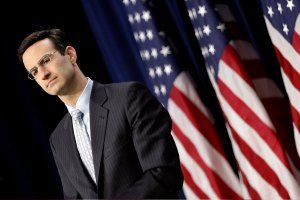
Normally, the anticipated resignation of the director of the Office of Management and Budget wouldn't be much of a news story. Wonks come, wonks go. But Peter Orszag was no ordinary wonk. Young and telegenic, with the earnest, precise air of a well-sharpened pencil, Orszag was the administration's most unlikely media star: a marathon-running economist who inspired mash sites (notably Orszagasm, which sighed that Orszag was "putting the OMG back in the OMB"), whose scandals were more tabloid than white paper (his engagement to Bianna Golodryga, a glamorous Good Morning America correspondent-cum-anchor, was announced days before news broke that he'd fathered a child with Claire Milonas, a Greek shipping heiress and venture capitalist), and who drove policy rather than simply measured it.
Before Orszag was named OMB director, he led the Congressional Budget Office. Where OMB is part of the executive branch and advocates for the president's priorities, CBO is an independent budget watchdog that traditionally contents itself with estimating the likely cost of legislation and the probable size of the federal deficit. But Orszag thought the watchdog needed to do a bit more barking: in particular, he believed that the relentless march of health-care costs posed a dire threat to federal finances. People talked about the "entitlement crisis," but that was a mistake: Social Security was a trivial problem. The issue was Medicare and Medicaid, and they were following the trends of the broader health-care sector. Health-care reform, Orszag argued in a series of speeches and blog posts, was entitlement reform.
This line of argument became particularly important in late 2008, when the financial crisis wrecked the nation's budget picture and forced a deficit-busting rescue. With pundits quickly converging on a new conventional wisdom that the next president would have to trim his sails and tend to the debt, Orszag weighed in with a forceful case for health-care reform.
"Many observers have noted that addressing the problems in financial markets and the risks to the economy may displace health care reform on the policy agenda," he wrote on his blog. But, Orszag warned, the government's future solvency depended on bringing health-care costs under control. The market's trust in our ability to repay our loans had been the only reason we could borrow the money to mount the shock-and-awe response to the financial crisis that had saved us. And if we didn't get health-care costs under control, Orszag said, we'd lose that trust. "If you think the current economic crisis is serious," concluded Orszag, "and it is, imagine what it would be like if we didn't have the ability to undertake aggressive and innovative policy interventions because creditors were effectively unwilling to lend substantial additional sums to the Federal government."
That reads like wonk but translates, at least in policy circles, as a screaming siren. But Orszag paired the gloom-and-doom with an optimistic theory of how to avert disaster. Where most people assumed that controlling health-care costs would eventually mean confronting the dread specter of "rationing," Orszag, taking his cue from reams of research showing that states that spent a lot of money on per capita Medicare spending didn't have better outcomes than states that spent much less, argued that a substantial portion of each dollar we spend on health care is wasted. The answer wasn't cutting care, he said, but amassing much more evidence on what worked and what didn't, and then integrating that data into a health-care system armed with electronic medical records and software to help doctors make evidence-based decisions. That was a strategy politicians could support without seeing their careers flash before their eyes.
Soon after, Obama won the election and Orszag was named to the OMB, where he headed the health-care-reform effort. During the process, Orszag played full-court press, fighting internal battles over the shape of the plan, emerging as a key media spokesperson, and proving himself an adept congressional negotiator. After the endless negotiations over the stimulus package, which included billions for the research and computer systems that Orszag believes are crucial to the future of health care, Senate Majority Leader Harry Reid said, "In my mind, if there is a hero in all of this, it is Peter Orszag."
On a policy level, Orszag was wildly, even improbably, successful. A bill was passed. The Congressional Budget Office, now under the watchful gaze of Doug Elmendorf, certified it as deficit-reducing. Orszag's two top priorities—an independent commission empowered to aggressively reform Medicare and a tax on high-value insurance plans—survived the process.
But on a political level, he lost the argument: polls showed that few Americans thought the legislation would reduce the deficit. The conversation has turned to long-term deficit reduction without even a breath spared for the long-term deficit cuts that Orszag muscled into the bill. In the most recent Washington Post/ABC poll, 56 percent of Americans disapproved of the way Obama has handled the deficit. The health-care bill itself is not popular, and the No. 1 concern is cost.
If vindication is to be had, it won't come in the next year or two. These questions won't be resolved by polls or even by elections. They'll be answered by Orszag's successors at the Congressional Budget Office, who'll test how the bill has fared in the years after its implementation. All eyes, then, turn to the next Peter Orszag.
Uncommon Knowledge
Newsweek is committed to challenging conventional wisdom and finding connections in the search for common ground.
Newsweek is committed to challenging conventional wisdom and finding connections in the search for common ground.





